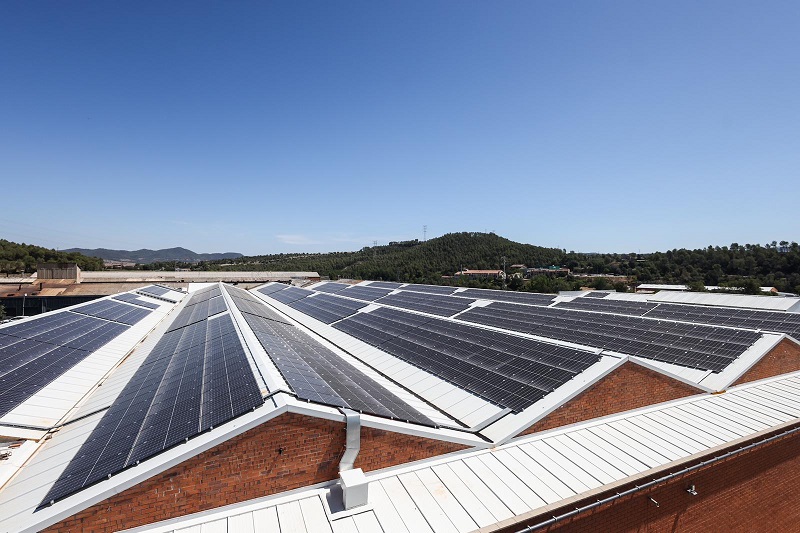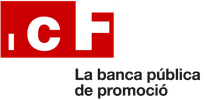The public bank lends 1.6 million euros to the Bages company to replace the fibre cement roof of its warehouse with an insulated roof that now houses a solar energy park that saves 726 tons of CO₂ per year. The bank's financing has also allowed the company to carry out energy efficiency improvements in its offices, thanks to which it has obtained an A energy rating, the highest possible score.

The Catalan Institute of Finance (ICF) has financed Peinaje del Río Llobregat, the company in the Bages region specialising in the treatment of liquid waste, to install a photovoltaic plant with an impact equivalent to planting 36,302 trees. Generalitat de Catalunya's public bank has granted the company 1.6 million euros to renovate the roof of its warehouse in Sant Fruitós de Bages: the 7,000 m² that were previously covered with fibre cement have been replaced by highly insulated sandwich panels and a system of solar panels has been installed on the new roof that will save the company 726 tons of CO₂ per year.
The new photovoltaic energy infrastructure, with a power of 980.4 kW and a storage capacity of 297 kWh, and the dismantling of the old fibre cement roof have allowed Peinaje del Río Llobregat to reduce its carbon footprint and mitigate its climate impact while eliminating a material potentially hazardous to health. The company has also carried out refurbishment works at its offices in Sant Fruitós de Bages with which it has obtained an A energy rating, the highest possible score, after applying improvements to the air conditioning, ventilation, closures and thermal insulation systems.
The investment necessary to carry out both actions, framed within the company's strategic plan to reduce its environmental impact and energy expenditure, has been covered at 81% by the ICF through its ICF EcoGreen loan lines, aimed at financing sustainable investments or working capital needs for energy efficiency or green economy projects, and ICF Eurocrèdit. In addition, the new energy improvements have also had the support of the ICAEN (Catalan Institute of Energy).
This morning, during her visit to the company's facilities, the Minister of Economy and Finance of the Generalitat, Natàlia Mas Guix, highlighted the "urgent" need to adapt the Catalan production model to the challenges arising from climate change. And, in this sense, he considered the role of the ICF "essential" "as a public bank of promotion guided by social and sustainability criteria".
Mas Guix explained that the ICF has several lines of financing "to promote green economy, circular economy or energy efficiency projects", and recalled that, in 2023, the amount allocated by public banks to promote projects in this area increased by 23% compared to the previous year.
For her part, the CEO of the ICF, Vanessa Servera, said that "it is very gratifying to see first-hand how the financing of the public promotion bank materialises in ambitious initiatives that promote the energy transition of the Catalan business fabric and benefit society as a whole". "Investing today in transformations such as the one carried out by Peinaje del Río Lobregat is investing in a sustainable future, which is why at the ICF we make our services available to those companies that want to join forces against the climate crisis," he added.
"With these works, we demonstrate our ability to launch transformative projects and reinvent ourselves whenever the opportunity arises, while complying with the environmental commitments we assume in our strategic plan," said Eloi Tarrés, CEO of Peinaje del Río Llobregat.
A curious reconversion: from working with wool to dealing with liquid waste
Tarrés' reference to the conversion capacity of Peinaje del Río Llobregat is no coincidence. The company, established in 1964 in Sant Fruitós de Bages, was originally a sheep's wool washing and combing plant that became a world reference. "Hence the name 'Peinaje' that we still hold with pride," explained the company's CEO. In fact, it was not until 2010 that it was transformed into liquid waste management, taking advantage of part of the existing infrastructure and thanks to a subsequent heavy investment.
Currently, Peinaje del Río Llobregat is one of the leading companies in the sector in Catalonia and, thanks to its technology and its environmental management system certified by the European Union (EMAS), it returns more than 90% of the wastewater it treats to nature. Among its main customers is the textile chemical company of Vallès Occidental Asutex, as well as the regional councils of El Pallars Jussà and El Pla d'Urgell.

